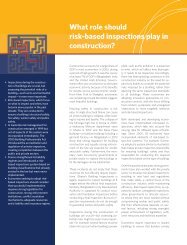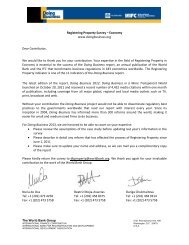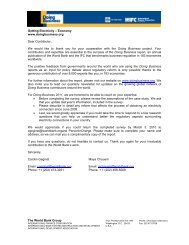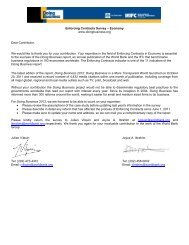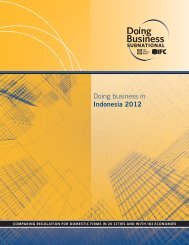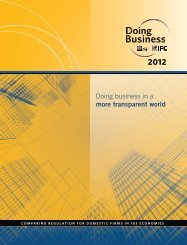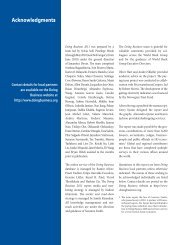Economy Profile: Burundi - Doing Business
Economy Profile: Burundi - Doing Business
Economy Profile: Burundi - Doing Business
Create successful ePaper yourself
Turn your PDF publications into a flip-book with our unique Google optimized e-Paper software.
<strong>Doing</strong> <strong>Business</strong> 2013<br />
<strong>Burundi</strong><br />
58<br />
PROTECTING INVESTORS<br />
Investor protections matter for the ability of<br />
companies to raise the capital they need to grow,<br />
innovate, diversify and compete. If the laws do not<br />
provide such protections, investors may be reluctant<br />
to invest unless they become the controlling<br />
shareholders. Strong regulations clearly define<br />
related-party transactions, promote clear and efficient<br />
disclosure requirements, require shareholder<br />
participation in major decisions of the company and<br />
set clear standards of accountability for company<br />
insiders.<br />
What do the indicators cover?<br />
<strong>Doing</strong> <strong>Business</strong> measures the strength of minority<br />
shareholder protections against directors’ use of<br />
corporate assets for personal gain—or self-dealing.<br />
The indicators distinguish 3 dimensions of investor<br />
protections: transparency of related-party<br />
transactions (extent of disclosure index), liability for<br />
self-dealing (extent of director liability index) and<br />
shareholders’ ability to sue officers and directors for<br />
misconduct (ease of shareholder suits index). The<br />
ranking on the strength of investor protection index is<br />
the simple average of the percentile rankings on<br />
these 3 indices. To make the data comparable across<br />
economies, a case study uses several assumptions<br />
about the business and the transaction.<br />
The business (Buyer):<br />
• Is a publicly traded corporation listed on the<br />
economy’s most important stock exchange (or<br />
at least a large private company with multiple<br />
shareholders).<br />
• Has a board of directors and a chief executive<br />
officer (CEO) who may legally act on behalf of<br />
Buyer where permitted, even if this is not<br />
specifically required by law.<br />
The transaction involves the following details:<br />
• Mr. James, a director and the majority<br />
shareholder of the company, proposes that<br />
WHAT THE PROTECTING INVESTORS<br />
INDICATORS MEASURE<br />
Extent of disclosure index (0–10)<br />
Who can approve related-party transactions<br />
Disclosure requirements in case of relatedparty<br />
transactions<br />
Extent of director liability index (0–10)<br />
Ability of shareholders to hold interested<br />
parties and members of the approving body<br />
liable in case of related-party transactions<br />
Available legal remedies (damages, repayment<br />
of profits, fines, imprisonment and rescission<br />
of the transaction)<br />
Ability of shareholders to sue directly or<br />
derivatively<br />
Ease of shareholder suits index (0–10)<br />
Access to internal corporate documents<br />
(directly or through a government inspector)<br />
Documents and information available during<br />
trial<br />
Strength of investor protection index (0–10)<br />
Simple average of the extent of disclosure,<br />
extent of director liability and ease of<br />
shareholder suits indices<br />
the company purchase used trucks from another<br />
company he owns.<br />
• The price is higher than the going price for used<br />
trucks, but the transaction goes forward.<br />
• All required approvals are obtained, and all<br />
required disclosures made, though the transaction<br />
is prejudicial to Buyer.<br />
• Shareholders sue the interested parties and the<br />
members of the board of directors.



